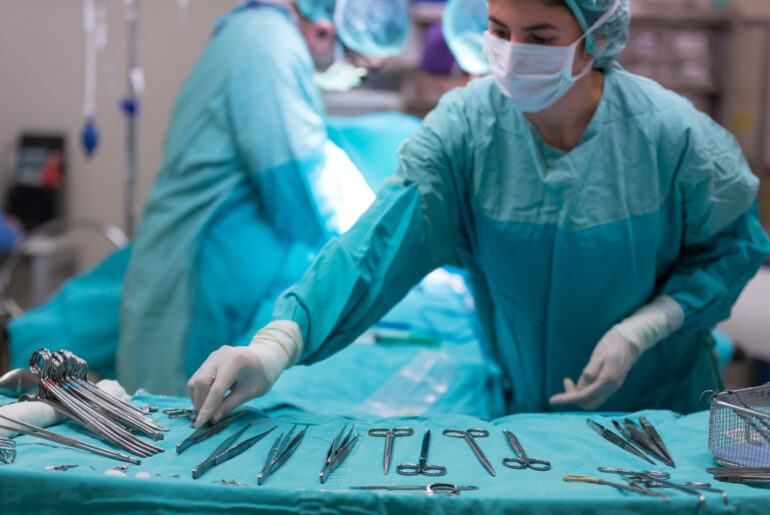Many careers in the medical profession will likely need four or more years of education before you can work in the healthcare field. Becoming a certified surgical technologist (CST) only requires a two-year commitment, which means less tuition and a shorter time to a degree.
Job Duties
Surgical technologists play a vital role in the operating room by ensuring a well-organized and sterile environment. They aid in surgeries and operations from beginning to end. Surgical techs start by preparing the operating room, arranging and sterilizing medical equipment, and assisting doctors throughout the operating process.
Other duties in and around the operating room include:
- Preparing patients for their procedure, including washing and disinfecting incision sites
- Sterilizing equipment and ensuring there are adequate supplies available for surgery
- Assisting surgeons and other medical professionals during surgery by passing them instruments and other sterile supplies
- Calculating medical supplies, such as surgical instruments, to ensure that no foreign objects are contained in patients
- Managing a sterile environment to prevent patient infection
Most surgical technicians work in hospitals, physician offices, or outpatient surgery centers.
Surgical technologists have access to the latest technologies, including laser technology, fiber optics, and other robotic surgical procedure tools.
Education Requirements
Surgical technologists generally need a diploma, certificate, or associate’s degree from an accredited surgical technology program. Surgical technologist students study anatomy, microbiology, physiology. They learn about the care and safety of patients, sterilization techniques, how to set up technical or robotic equipment, and preventing and controlling infections. Outside of the classroom, students gain hands-on experience in supervised clinical settings.
Effective 2020, the National Board for Surgical Technology and Surgical Assisting (NBSTSA) requires surgical technologists to renew their certification every two years. You will also need to complete 30 hours of continuing education (CE) during each renewal cycle.
Attributes of a Good Surgical Technologist
Being a surgical tech can be a physically demanding job as they oftentimes work long hours on their feet. They’re also subject to being on-call and working nights or weekend shifts. Having the following skills helps to ensure that you are well-equipped to handle the job:
- Stress-management skills and the ability to work in emergency situations and under pressure
- The ability to act swiftly and accurately
- Works well with the surgical team
- Excellent communication and listening skills
- Exhibits manual dexterity
- Detail oriented
- Physical stamina since they are expected to stand for extended periods
- Empathy
- Integrity, ethical, and honesty
RELATED: You Have a Cool Job: Surgical Technician
Salary and Job Outlook
Surgical technologists earn a median annual wage of $49,710. According to the U.S. Bureau of Labor Statistics, employment for surgical technologists is projected to grow nine percent from 2020 to 2030.
Surgical technicians can accelerate their careers by becoming specialized in areas like organ transplants, tissue repair, or reconstructive surgery. Advancement to the role of first assistant is also possible after completing additional training.
RELATED: Doctor Isn’t Your Only Option: Healthcare Careers that Require Only 2 – 4 Years of School
Preparing for the Exam
Peterson’s helps you prepare for the CST exam with three full-length practice tests. You will have four hours to answer 175 questions (150 if which are scored) on the CST exam. Practice tests prepare you for the content featured on the CST exam:
- Perioperative care (preoperative prep, intraoperative procedures, postoperative procedures)
- Ancillary duties (administrative and personnel, equipment sterilization and maintenance)
- Basic science (anatomy and physiology, microbiology, and surgical pharmacology)
Get started with Peterson’s CST exam prep and take the test with confidence!



